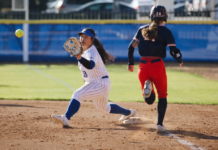On Dec. 22, 2015, the NCAA Division I Committee on Infractions issued its punishment to the University of Hawai’i men’s basketball team and its former head coach, Gib Arnold. And, spoiler alert: They did not come down easy. According to the NCAA, Arnold “did not promote an atmosphere for compliance in his program” and the list of punishments is as follows: a postseason ban for the 2016-17 season and a reduction of two scholarships for the 2016-17 and 2017-18 seasons. Arnold himself received a three-year show-cause order and a suspension for 30 percent of the basketball season if hired by an NCAA institution. Former assistant Brandyn Akana was also handed with a two-year show-cause order, according to CBS Sports.
The sanctions emerged as a result of a year-long investigation into the men’s basketball program at Hawai’i, one of which uncovered an even longer list of NCAA rule violations. First, a former director of basketball operations was found to be participating in both scouting and instructional on-court activities, an act which Arnold misled the NCAA about. Arnold also found that a player was using a booster’s car and failed to report this to his compliance department, rather telling them to keep the information in-house.
Finally, Akanya was found to have altered two student forms: one in an effort to ensure a student-athlete would qualify for admission to the university along with an international student’s supplemental information form after discovering his original information was insufficient for admission. Akanya also gave both students iPads and failed to inform the committee during the investigation, according to the NCAA.
And with all of that, one question remains: Does the punishment truly fit the crime? In a vacuum, Hawai’i was rightfully punished as they knowingly violated a slew of rules and did so whilst turning a blind eye. Yet, in a world as complex and contradictory as the NCAA, nothing operates in a vacuum. The reality is, while teams such as Hawai’i — who, by the way, had already self-imposed a vacation of 36 wins, a $10,000 fine and a limitation of recruiting visits prior to being handed penalties by the NCAA — can be distinctly subject to the law of the land, plenty others can suffer relative slaps on the wrist for violations just as — if not more — wrongful.
For the most part, what Hawai’i did was indeed unethical. Yet just as wrong — and perhaps more detrimental to a student’s actual livelihood — was what Memphis basketball program and head coach John Calipari did in 2007: having an unknown individual take Derrick Rose’s (the number-one high school recruit in the nation at the time) SAT examination to ensure his admission.
Sure, Memphis was eventually handed a penalty that vacated their entire 2007-08 season due to that violation, including their runner-up status in the NCAA championship game, but the rest was handled with a $100,000 out-of-court settlement. Calipari was not suspended for any portion of games nor were any Memphis assistant coaches or officials. This is just one example.
More recently, Larry Brown, the current head coach at Southern Methodist University and a repeat offender of NCAA regulations was deemed to have “failed to promote an atmosphere of compliance within his program” by the NCAA, a statement identical to that which was applied to Arnold. For the violations — which included an ex-assistant forging a recruit’s eligibility and another ex-assistant completing said recruit’s coursework — SMU lost a potential 2016 postseason birth (despite not having much of a shot to earn one anyway), Brown was suspended for nine games and the program will lose seven scholarships over the next three years. This was Brown’s third offense and SMU’s 10th major infraction — an NCAA record.
Yet, even for the most rampant offenders, and for transgressions that at the very least stand on equal measure with that of Hawai’i’s, the penalties handed down are much less detrimental.
Inconsistency is the concern here for the NCAA. If program directors are not permitted to act as quasi-coaches that is fine; if athletes are not allowed to receive free iPads or use a booster’s car to get around (rules which are all the more laughable on their own) that is okay. I get it (not really). And obviously altering eligibility forms is a serious matter that deserves to be penalized.
But to equate any of that as significantly more damaging to the code of conduct than coaches actively taking athlete’s courses, placement exams and doing coursework is a joke. At some point, the NCAA has to get it right across all platforms. And starting by better administering their own regulations would be a step in that direction. Because as it stands, for an association that preaches honorability and ethics, there exists an awful lot of skepticism as to the reputability of their own conduct.







